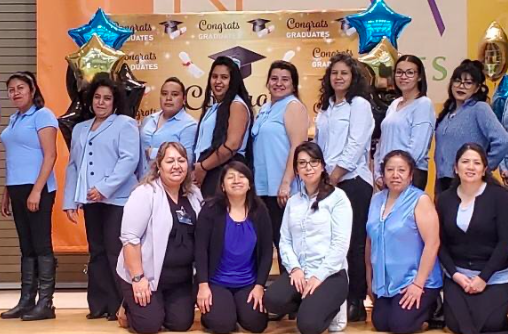I’m a parent facilitator for the California Association for Bilingual Education (CABE). CABE specializes in family and community engagement by way of teaching immigrant parents how the U.S. educational system works. We support bilingual education and prepare parents to be leaders in advocacy, which to us means supporting initiatives that benefit the success of all students.
I started working with New Academy Canoga Park three years ago. Before I was invited by New Economics for Women to work with the parents of NACP, I did not know what a charter school was. Honestly, I used to think that charter schools were competition for public schools. My children are already college graduates and I never enrolled them in a charter school, but if I had known what I know now about charter schools, I think I would’ve. Through NACP I’ve learned a lot about how charter schools work and how to empower parents and children within charter school systems.
As soon as I got to NACP, I was impressed. Charter schools try to give students the best education, while also actively engaging parents in the process. This model that NACP uses seemed like a great opportunity for students to plan beyond just college and really prepare to be leaders in their communities. It wasn’t just the model I was impressed by, but I saw firsthand how attentive New Academy is to its parents and their parent center. When schools like NACP give parents the opportunity to be leaders in their child’s education, they not only open doors for the parents, but also for the students. When parents are motivated, students will have success.
Once I understood that parents at NACP were being supported by the administration, I got to work on empowering them to be leaders and advocates. It’s a great thing that charter schools are self-governed, but it’s not always easy for them to run themselves because of finances. They are not fully funded by the government and often have more expenses than regular public schools. Because of this, one way we empowered parents to be advocates for their school was by educating them on how to collaborate and raise money. The director and parents have to work together to not only keep the school running, but also to help it grow. Through advocacy, NACP has the potential to expand to a K-12 education facility, instead of just an elementary school. This would benefit students who might struggle with attending a public school after graduating from and getting accustomed to their charter elementary school.
For CABE it’s always been important to raise awareness for parents about education and academics and we strive to continue that mission. While I’ve become passionate about charter schools and the work I’ve done with the families at NACP, CABE teaches parents that every student has the right to succeed. There are opportunities for students at both public and charter schools and students should take advantage of all their opportunities. And as parents, you have the right to choose a school where you feel supported and where you can be the best advocate for your child’s education.

